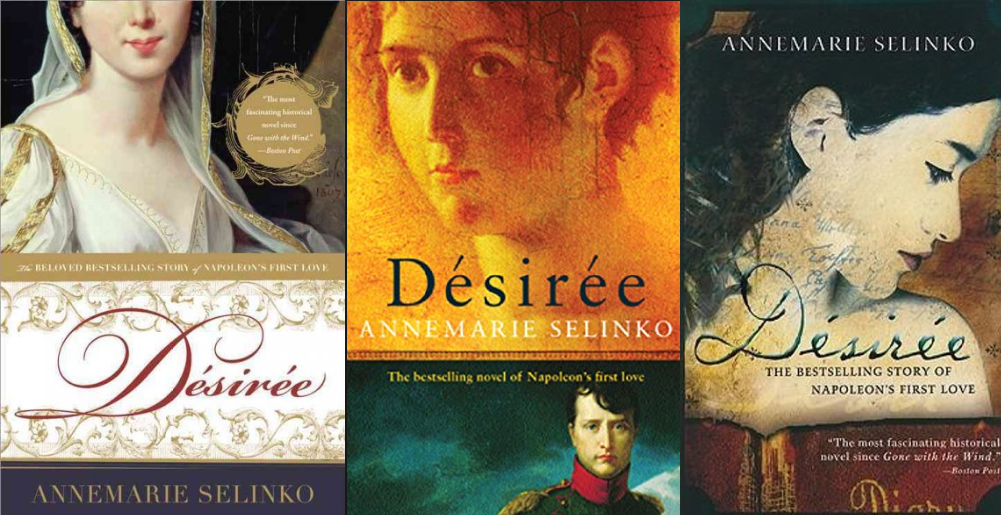Here’s another epic romance riding on the coat tails of Gone With the Wind. It’s even blurbed that way on some editions: “The most fascinating historical novel since Gone With the Wind” -Boston Post. But does it hold it up to the hype?
Book details:
Title: Désirée
Author: Annemarie Selinko
Original publication date: 1953
Setting time & place: Revolutionary France, also Sweden.
He is… a Republican general on the up and up.
She is… the 16 year old daughter of a silk merchant.
Reasons to read this title: If you’re really into the life of Napoleon. Maybe.
My review of Désirée
Is it a romance novel? No. What romance there is fades among the wider historical events. And there’s cheating.
Is it a must read romance novel? Nope nope nopity nope.
Out of thirty books on my reading list, I suppose it was inevitable that I wouldn’t like some of them. Pamela Andrews was a cloying goody-two-shoes. Scarlett O’Hara was a bitch in a racist narrative, and Amber St. Claire grew monotonous in her promiscuity. Désirée Clary, though, leaves me indifferent, even after following her life and loves for six hundred pages.
It started well enough:
A woman can usually get what she wants from a man if she has a well-developed figure. So I’ve decided to stuff four handkerchiefs into the front of my dress tomorrow.
Young Désirée happens to meet Joseph Bonaparte, and then Joseph’s younger brother Napoleone (who later drops the ‘e’ at the end of his name to appear more French). And then their mother and all their other siblings, a sprawling family of Corsican refugees who are trying to stay afloat in Republican France. Napoleone is already a general in the army, but he’s poor as dirt, which no doubt influences the decisions of both Bonaparte brothers to propose to two Clary sisters: Désirée and her older sister Julie. Julie and Joseph marry, but Désirée is too young and must wait while Napoleone goes off to establish himself or invade Italy or something. Oops, and break his engagement to marry this lady Josephine who has political connections in Paris that Mlle. Clary does not.
Not a love story
This is a book which bills itself as a love story between Désirée and Napoleon, even when it is clearly not a love story between Désirée and Napoleon. Throughout the rest of the story, Napoleon is presented as still kinda in love with Désirée? She gets called out in the middle of the night to talk to him, or maybe his wife, or his mother, about pivotal moments in history. Meetings that are clandestine, probably unverifiable in the historic record, and completely fabricated by Selinko.
“Me?” I was really astonished.
“Yes, only you. I don’t know why either–” sobbed Hortense into her chocolate cup.
“And now–in the middle of the night?”
“The Empress can’t get to sleep,” Hortense moaned. “And she won’t see anyone–Just you.”
Not romantic meetings with Napoleon, though. Most of the meetings seem to be an excuse for Selinko to get Désirée into a place where she can have some reason to relay a bit of Napoleonic history. There’s nothing sexy in this book, which is much more the sort of book adults would want 14 year old girls to be reading than Amber St. Claire’s story. There are zero mentions of sexual intercourse, though there are many mistresses. Mistresses of Napoleon, and even mistresses of Désirée’s husband Jean-Baptiste Bernadotte. Yep, cheating by both the men who are supposedly in love with Désirée.
A lack-luster hero
Bernadotte, by the way, is a much more principled man than Napoleon Bonaparte. He rises in the ranks on both military brilliance and honorable treatment of both his own soldiers and enemy combatants. Eventually, the Swedes, in need of an heir to the crown because their king was childless and other members of the royal family were probably mentally unfit, or something? You’d think I’d understand after reading this book and articles about it but I don’t. It seems to have happened sort of coincidentally: a Swedish noble in France took intiative to offer the position to Bernadotte and after the fact the rest of Sweden decided that this French Republican general looked like a good bet. He had a good military record, and a healthy son who’d already survived his first decade.
The kind of guy who is elected king by rational Scandinavians and adored by his troops sounds like a pretty good alpha hero, right? In the early section of the book, when Selinko is working more in fictional it-could-have-happened-this-way-land, they do have a very romantic meeting. Bernadotte is on hand when Désirée, looking for Napoleon, witnesses her fiance announcing his intention to marry Josephine. Bernadotte follows her after she runs out and spends an evening talking her down from suicide, and tells her that he’d love to marry her. But since she’s not credibly in Paris at the time, she returns to Marseilles and doesn’t marry him until they officially meet several years later. Then he’s mostly off in battle, or governing Hanover, occasionally coming home to call her “little girl” and “little one” and take a nostalgic carriage ride past the bridge where she nearly threw herself into the Seine while Désirée leans against his shoulder and reflects on how scratchy his gold epaulets are. They are always scratchy and she always leans her cheek on them anyway…
A too stupid to live heroine
Désirée never seems to develop past the fourteen-year-old she is at the beginning of the book. She’s continually claiming that she has no knowledge of rudimentary geography and being ignorant of foreign names. Her first descriptions of the Bonaparte’s are complaints that she can’t remember the weird name–Boonaparte? Something like that. Later she writes about meeting a composer her husband has admired:
The Viennese musician’s name is–I thought I remembered it–a very foreign name, probably German–yes, his name is Beethoven.
While she may not have been overly educated, a lot of her ignorance seems disingenuous. After discussing the Hanoverian merchants trading with the Hanseatic League, Désirée later doesn’t know where Danzig or Lubeck are. I realize that the Napoleonic Empire didn’t have access to Wikipedia, but a cursory internet search tells me that Lubeck was the capital of the Hanseatic League and really? Her husband mentions Finland, she doesn’t know where Finland is. Her husband is elected heir to the Swedish crown. Her husband has been heir to the Swedish crown for several years and manages to bring Norway under Swedish rule. Désirée , of course, comments that she doesn’t know where Norway is. Didn’t you notice it on the map when you were looking up Finland or Sweden?!?
Désirée makes me cranky. She’s almost a too stupid to live heroine, except she’s never in danger of not living. Traveling through Germany in winter? It’s cold and there’s battlefields of corpses, but at least she has some sables that Napoleon gave her (secretly). Starving people in the streets of Paris? She’s got Swedish troops watching her front door and a surprise income from her inherited portion of her dad’s silk business to buy some food for her household. Her biggest challenge is acting as Crown Princess at the Swedish court, which makes her so uncomfortable that she goes back to France where she can hang with her sister Julie. Not that there’s anything wrong with preferring to be a bourgeois homebody to a royal socialite, but the portrait created by Selinko doesn’t give much character growth for Désirée.
Also, Napoleon
The one character who does develop is Napoleon. He’s a hungry (in more ways than one) young soldier in the beginning. He gains power, loses innocence, becomes cynical and flaccid. I really got the impression that Selinko wanted to write a book about Napoleon, but having lived in Sweden and France, she had the idea that she would frame it through Désirée’s experiences.
Unfortunately, it was not a good decision. Recounting events through Désirée’s diary leads to a lot of tortured plotting. Despite the midnight meetings with destiny, Désirée avoids many official events and is always asking other people to tell her what they witnessed. Then she transcribes the conversation, including her “and then what happened?” questions. She copies out letters from her son and paraphrases what the newspapers say about Napoleon or Bernadotte.
“And the people, the other spectators. What did they say?
“All sorts of things. There was so much to see.”
Ugh.
So, at the end of the day, I can’t recommend this read and I can’t exactly understand how it became a best-seller. If Forever Amber was a retelling of Gone With the Wind, Désirée is barely even an echo as an historical epic. It has, however, been translated into 25 languages and made into a movie. Since the movie has Marlon Brando as Napoleon, I kind of want to see it, even though I’ve passed up all movie adaptations of the books so far. I’ll leave you with a few remarks from NY Times movie critic Bosley Crowther on the film, which I think applies to the book as well:
The only essential missing is a story of any consequence … Mr. Taradash’s script is quite positive in indicating that Napoleon loved the girl in the first flush of his ascendancy. But then it permits the amorous passion to appear to die, and there is not much in this line to intrigue the viewer until the end of the film. … The consequence is a static story, so far as the emotions of the individuals are concerned, and a strangely unrevealing presentation of two potentially exciting characters.
My Mid-Century Love Stories unit is turning out to be an instruction in ‘novels that people think are romances but aren’t Romances’! I’ve got one more, and it’s another foreign best-seller that was translated to English: Angelique.



